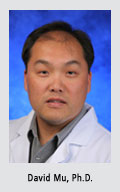David Mu, PhD, takes aim at lung cancer
 By the time lung cancer is diagnosed, it’s often too far along to cure. Right now, lung cancer kills more Americans than any other kind of cancer. Still, David Mu, Ph.D., an associate professor of pathology in the Departments of Pathology, Biochemistry, and Molecular Biology, believes that a strong collaboration among basic scientists, clinical researchers, and treating clinicians is the key to stopping this complex disease in its tracks.
By the time lung cancer is diagnosed, it’s often too far along to cure. Right now, lung cancer kills more Americans than any other kind of cancer. Still, David Mu, Ph.D., an associate professor of pathology in the Departments of Pathology, Biochemistry, and Molecular Biology, believes that a strong collaboration among basic scientists, clinical researchers, and treating clinicians is the key to stopping this complex disease in its tracks.
Since his arrival at Penn State College of Medicine two years ago, Mu’s laboratory work has focused on the actions of three mutated genes—TTF1, NKX2.8 and PAX9—and how they promote the development of lung tumors. In recent years, Mu, who previously worked in the biotechnology industry, linked these three genes to lung cancer.
What’s become clear since then, he says, is that mapping out the chain of events by which they are activated could help yield new drug combinations far more potent than therapies that take a more generic approach.
In a recent study, Mu and colleagues analyzed samples of cancerous tissue taken from patients with lung tumors. Looking at the activity of these three genes, the researchers found that patients who had both the TTF1 and NKX2.8 genes switched on were less likely to survive than those who had only one gene activated. Furthermore, they discovered that the group of patients with both genes switched on developed resistance to cisplatin, the best-known chemotherapy treatment for many cancers. The next step, Mu says, is to figure out what biological factors activate these genes and how that correlates to drug resistance. “Hopefully our work will open up avenues that lead to new strategies and better diagnosis and treatment options,” he says.
On another front, Mu’s lab is working to find new uses for existing drugs. In biological experiments, his team is testing drugs on breast and lung cancer cells that lack a targeted therapy. “We’re looking to identify existing drugs that will synergize with targeted therapies so that the targeted therapy will be more effective on specific types of tumors and also have the ability to overcome resistance,” Mu says. His goal is to develop drug combinations that will fight hard-to-treat cancers such as triple negative breast cancer which is a type of breast cancer that does not express estrogen receptor, progesterone receptor, and HER2 receptor. This type of hard-to-treat breast cancer disproportionately accounts for breast cancer deaths. Ultimately, he hopes to be able to work with the Penn State Hershey Cancer Institute to demonstrate how the new combination therapy could work.
Finally, Mu is intent on inspiring the next generation of scientists. Mu received federal stimulus funding to hire summer research interns. The National Institutes of Health grant enables him to select undergraduates from central Pennsylvania universities to explore “real science” in his lab every summer. “Students from non-research intensive universities get an opportunity to do real research” Mu explains. “They may have Nobel Prize-winning intelligence, but if they’re never exposed to research they may not consider pursuing a scientific career.”
by Paula Rasich
If you're having trouble accessing this content, or would like it in another format, please email Penn State Health Marketing & Communications.
